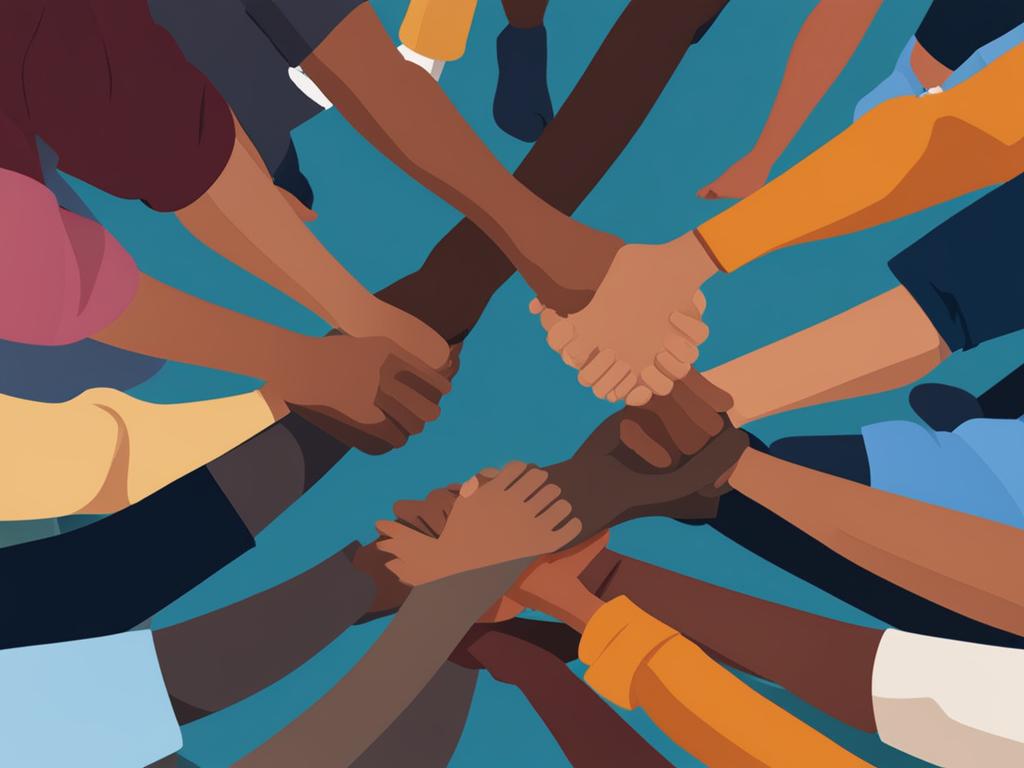Navigating Support for Substance Abuse Recovery
Dealing with substance abuse can be a difficult and isolating experience, but you don’t have to go through it alone. Seeking support is an essential step towards the path to recovery. In this section, we will explore the various forms of support for substance abuse recovery available, including recovery strategies, counseling options, and support groups.
Getting the right kind of treatment and support can make a significant difference in your recovery journey and help you stay on track towards long-term sobriety. Whether you’re struggling with alcohol, drugs, or other addictive substances, there are resources available to help you overcome addiction and build a healthier future.
Key Takeaways
- Support is crucial in overcoming substance abuse and addiction.
- There are various forms of support available, including counseling, support groups, and helplines.
- Getting the right treatment can make a significant difference in the recovery journey.
- Recovery is a challenging journey, but it is possible with the right help and support.
- Reaching out for help is the first step towards recovery.
Substance Abuse Treatment Options
Recovery from substance abuse is a challenging journey that requires a personalized approach. With various types of treatment options available, individuals can choose an approach that best suits their needs. Understanding the available treatment options can help individuals make more informed decisions about their recovery journey and achieve long-lasting sobriety.
Inpatient Rehab Programs
Inpatient rehab programs offer 24/7 care and support to individuals struggling with substance abuse. These programs are ideal for individuals with severe addiction and those who need medical supervision during detoxification. Inpatient rehab programs often include detoxification, group and individual therapy, medication management, and aftercare planning. These programs typically last from 30 to 90 days, depending on the individual’s needs.
Outpatient Services
Outpatient services are a suitable option for individuals with mild to moderate addiction. These programs offer flexible treatment schedules that allow individuals to receive treatment while still attending work or school. Outpatient services can include individual and group therapy, medication management, and aftercare planning. These programs typically last 10 to 12 weeks.
“Understanding the available treatment options can help individuals make more informed decisions about their recovery journey and achieve long-lasting sobriety.”
Recovery Support Services
Recovery support services are voluntary services that provide ongoing support and assistance to individuals in recovery. These services can include housing, employment support, education and training, and peer support. Recovery support services can help individuals maintain their sobriety and rebuild their lives after addiction.
It is important to note that no single treatment option is suitable for everyone. Treatment approaches should be tailored to meet individuals’ specific needs. Working with a professional and experienced treatment provider can help individuals identify the most suitable treatment options and achieve their recovery goals.
Counseling for Substance Abuse Recovery
Substance abuse counseling is an essential component of addiction recovery. It can help individuals address the underlying issues that led to their addiction, develop effective coping mechanisms, and navigate the challenges of the recovery process.
There are several counseling approaches and techniques available, including cognitive-behavioral therapy, motivational interviewing, and family therapy. Cognitive-behavioral therapy (CBT) focuses on identifying and changing negative thought patterns and behaviors that contribute to addiction. Motivational interviewing is a client-centered approach that encourages individuals to explore their reasons for change and make decisions about their recovery. Family therapy involves the individual’s family in the recovery process to help build a supportive and healthy environment.
Ultimately, the goal of substance abuse counseling is to empower individuals to take control of their lives and develop strategies for long-term recovery. By addressing the root causes of addiction and learning healthy ways to cope with stress and challenges, individuals can build a foundation for a brighter future.

Intervention for Substance Abuse
Interventions, when done correctly, can be a powerful tool for helping individuals struggling with substance abuse seek the help they need. The purpose of interventions is to provide support, express concern, and encourage individuals to enter treatment. It is important to involve a trained intervention specialist who can guide the process and ensure the safety and well-being of everyone involved.
The role of loved ones in the intervention process is crucial. Family and friends can provide a support system and encourage the individual to seek help for their addiction. During the intervention, loved ones can express their concerns and offer encouragement for treatment, providing the individual with a sense of motivation and accountability.
Interventions can be a turning point for individuals who are in denial or resistant to seeking help for their substance abuse. When done in a supportive, non-judgmental manner, interventions can be a powerful catalyst for change.
The Importance of Seeking Professional Assistance
It is important to seek the assistance of a trained intervention specialist when planning an intervention. These professionals can provide expertise and guidance throughout the process. They can also help loved ones prepare for possible reactions or responses from the individual struggling with substance abuse, ensuring that the intervention remains a positive and supportive experience.
Interventions are just one aspect of the journey towards addiction recovery. Seeking professional help and treatment is essential for long-term success. By utilizing interventions as a tool for motivation and encouragement, individuals can find the support they need to overcome their addiction and build a healthier future.
Support Groups for Substance Abuse Recovery
Support groups can be a valuable resource for individuals in addiction recovery. By sharing experiences and struggles, individuals can develop a sense of belonging and acceptance, which can be crucial in maintaining sobriety. The two main types of support groups are 12-step programs and peer-led groups.
12-Step Programs
12-step programs, such as Alcoholics Anonymous and Narcotics Anonymous, have been around since the 1930s and provide a structured approach to recovery. The program consists of 12 steps that guide individuals through the recovery process, including admitting powerlessness over addiction, making amends for past wrongs, and surrendering to a higher power. Meetings are held regularly, and individuals are encouraged to find a sponsor who provides support and guidance.

Peer-Led Groups
Peer-led groups, such as SMART Recovery and Women for Sobriety, focus on self-empowerment and using evidence-based techniques to overcome addiction. These groups often use cognitive-behavioral therapy and motivational interviewing to help individuals address the underlying causes of their addiction and develop coping strategies. Meetings may be held in person or online, and individuals are encouraged to participate actively in discussions.
Overall, support groups provide a safe and welcoming environment for individuals in addiction recovery. By connecting with others who have similar experiences, individuals can develop a sense of hope and encouragement to continue on their path towards sobriety.
Helplines for Substance Abuse Support
Struggling with substance abuse can be a difficult and lonely experience, but you don’t have to go through it alone. Helplines are an important resource for individuals seeking immediate support and guidance in their recovery journey. Whether you’re looking for information on treatment options, counseling services, or support groups, trained helpline staff can provide valuable assistance anytime, day or night.
If you or a loved one is struggling with substance abuse, consider reaching out to one of the national helplines available. The Substance Abuse and Mental Health Services Administration (SAMHSA) National Helpline offers confidential support and referrals to treatment programs at 1-800-662-HELP (4357). Another excellent resource is the National Council on Alcoholism and Drug Dependence (NCADD) Hope Line, which can be reached at 1-800-NCA-CALL (622-2255).
No matter which helpline you choose, remember that help is just a phone call away. Take the first step towards addiction recovery today by reaching out for the support you need.
Resources for Substance Abuse Prevention
Preventing substance abuse starts with education and awareness. There are many resources available to help individuals make informed decisions and reduce the risk of addiction.
Educational Materials
There are many resources available to educate individuals and communities about substance abuse and addiction. The National Institute on Drug Abuse provides free educational materials, including publications and research reports, to help individuals learn about the causes and effects of addiction.
Community Programs
Community-based substance abuse prevention programs can provide valuable resources and support for individuals and families. Programs such as Drug Abuse Resistance Education (D.A.R.E.) and community outreach events can help raise awareness and provide education on substance abuse prevention.
Online Resources
There are many online resources available to individuals seeking information and support for substance abuse prevention. Websites such as the Substance Abuse and Mental Health Services Administration (SAMHSA) and the Partnership for Drug-Free Kids provide resources, tools, and support networks for individuals and families.
Get Involved
Getting involved in local and national prevention initiatives can be a powerful way to make an impact and promote awareness. Joining a local community organization or volunteering with a national organization can provide opportunities to connect with others and advocate for substance abuse prevention.
By utilizing these substance abuse resources and prevention tools, individuals can take an active role in reducing the risk of addiction and promoting a healthier future.
Conclusion
It’s essential to remember that seeking support for substance abuse recovery is a courageous step towards healing. Utilizing the various resources, treatment options, counseling services, support groups, and helplines available can provide the necessary guidance and assistance for individuals and their loved ones to overcome addiction and build a healthier future.
Whether you’re struggling with substance abuse yourself or supporting a loved one, it’s crucial to know that you’re not alone. There are thousands of people who have successfully embarked on the journey of substance abuse recovery and are now enjoying fulfilling and happy lives.
Remember, recovery is a process that requires patience and dedication. It’s crucial to celebrate small wins and to be kind to yourself throughout the journey. Do not hesitate to reach out for support if you encounter challenges or feel overwhelmed. You can do it!



Recent Comments